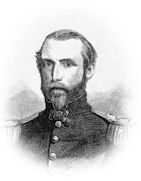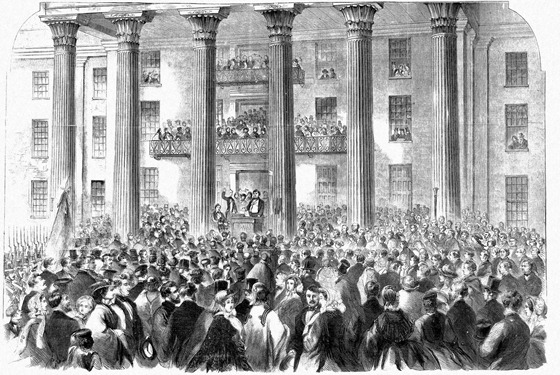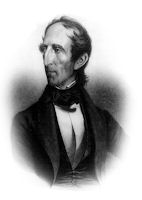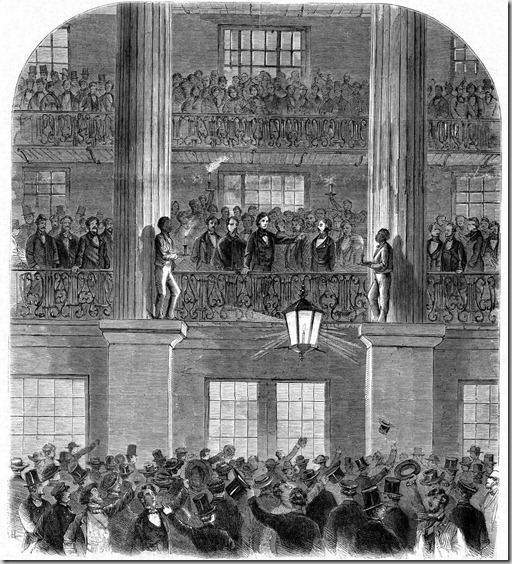“Inauguration of Jefferson Davis, President of the Southern Confederacy, at Montgomery, Ala., on Monday Feb 18, 1861. – From Sketch by our Special Artist;” (Frank Leslie’s Illustrated Newspaper, March 23, 1861)
MONDAY, FEBRUARY 18, 1861.
The forepart of the day was bright but the air cold and chilly, the latter part cloudy, windy and cold, freezing a little. Gov Polk of Missouri was in our room this morning. He is M.C. now. I was introduced to him. Mrs & Miss Butterfield were also at the pat off this morning. Mr B. left them with me and I attended them round the building. Put stove up in our third story after dinner, have had some stove pipe stolen from the celler the past week. Went down to the “National” and “Willards,” bothe Houses seem quite full. Conversation much less excited than a month since.
![]()
______
The three diary manuscript volumes, Washington during the Civil War: The Diary of Horatio Nelson Taft, 1861-1865, are available online at The Library of Congress.
—Jefferson Davis was inaugurated President of the Southern Confederacy.—(Doc. 37.)
[FEBRUARY 18(?), 1861.]
Governor PICKENS, Charleston, S.C.:
Kingman, known as “Ion,” who corresponds with the Baltimore Sun, and is considered reliable in his letter of yesterday, says he has seen and read a letter from a former member of Congress from South Carolina, which assures him that Fort Sumter will be taken on or before the 4th of March, “without reference to what the Montgomery government may advise or order on the subject.”
This startles the President. Will you quiet him by your reply?
The State commissioners will adjourn during the week. No result yet.
JOHN TYLER.
SUNDAY 17
A very pleasant morning. M. 40. Colder the middle of the day and quite a snow storm in the afternoon. Went to Church in the morning with wife & Boys, heard Doct Smith preach. Sunday School performance in the afternoon. Wife & Boys went. Myself and Willie staid at home. Took a walk with the Boys in evening. Tea at 7 o’clock. Spent the evening at home reading and explaining portions of Revolutionary History of U.S. Wife has played on the piano some and the Boys have read aloud & written some.
![]()
______
The three diary manuscript volumes, Washington during the Civil War: The Diary of Horatio Nelson Taft, 1861-1865, are available online at The Library of Congress.

“…a sudden check upon the military enterprise of the South Carolinians?”—Operations in Charleston Harbor
FORT SUMTER, S.C., February 17, 1861.
General Jos. G. TOTTEN,
Chief Engineer U. S. Army, Washington, D.C.:
GENERAL: Everything is quiet, and there are no evidences of the presence of many troops around us, nor of military preparation. The assumption of all questions relating to forts, arsenals, &c., by the Congress of the Southern Confederacy appears to have placed a sudden check upon the military enterprise of the South Carolinians. The only operation performed yesterday was the firing of three shots from the iron bomb-proof battery on Cummings Point, apparently for the purpose of trying the embrasure shutters. These shutters appear to be of iron, and are arranged like a trap-door, with a hinge at the upper edge, so that two men can open it—having, probably, a counterpoise in the interior.
I think these batteries can be destroyed by our fire by concentrating it upon one embrasure at a time, and aiming at the embrasure itself.
I cannot yet determine what is being done at Fort Moultrie. In addition to the sand bags, which raises the sole of the exterior about two feet, the whole embrasure is filled with a large bag of wool or cotton.
Very respectfully, your obedient servant,
J. G. FOSTER,
Captain of Engineers.
1861. February 17.—Mr. Reuter sends me a telegram from Queenstown of the American news. 1. The conference invited by Virginia met on the 4th, and re-assembled with closed doors on the 5th at Washington. 2. Slidell and Benjamin have withdrawn. 3. A truce between Lieutenant Slemmer and State forces at Pensacola Navy-Yard, followed by surrender to latter. 4. North Carolina resolves unanimously to go with the other slave States if adjustment fail. 5. United States revenue cutter Lewis Cass treacherously surrendered to Alabama. 6. Fifty thousand people starving in Kansas. 7. Secession of Texas definitive. 8. The President has refused to surrender Fort Sumter on Colonel Hayne’s demand; an attack expected. 9. Attempt on Fort Pickens abandoned. No blood yet spilt.

“Prof Rogers was in with a working model of his Steam and air Engine operating upon the principle of the “Jefford Injector” for Steam Boilers.”—Horatio Nelson Taft
SATURDAY 16
A delightful and bright warm day, but muddy in the streets. Worked pretty busily in the office today. Prof Rogers was in with a working model of his Steam and air Engine operating upon the principle of the “Jefford Injector” for Steam Boilers. In Rogers Engine the Steam took in a current of air into the Steam chest. He claims a gain of nearly 100 pr cent over the Comn [common?] S Engine. A boy brought a Box of excellent Cigars, present from W A Lighthall. Was in at Willards this evening. Saw W VanMaster from Lyons there, bot “Times.”
![]()
______
The three diary manuscript volumes, Washington during the Civil War: The Diary of Horatio Nelson Taft, 1861-1865, are available online at The Library of Congress.
The Hon. Jefferson Davis, President-elect of the new Southern Confederacy, addressing the citizens of Montgomery, Ala., from the balcony of the Exchange Hotel, on the Night of February 16th, 1861, and previous to his inauguration. – from a sketch by our special artist (Frank Leslie’s Illustrated Newspaper)
The world seems dark to me, so long without you. When shall we meet? . . . What do you conclude? I little thought of such a long separation when I left you. If I had one hundred dollars I would go back in April—unless you conclude it is best to come here. … I am feeling so distressed about Spencer that it takes the spirit all out of me, but I do try to commit him to my Saviour and trust that He will take care of him. If you come, if we can learn whether he is still at Newport, Kentucky, would it not be well for you to come by way of Cincinnati and get a proper situation for him, and take him, he being under age?
![]()
![]()
My Dear Father: . . . I presume you have about made up your mind to come this way as soon as possible. I want to see you very much, and a change will perhaps do you good; but I hope you will not take final leave of Kansas, because a roof there, though humble, is better than no roof at all—to say nothing of a farm. . . . With a friendly President, who knows but brighter days are dawning for us? After living in the West, the East does not seem so pleasant, unless one is very rich.
What do you think about Spencer? It seems dreadful to me.
Monday morning, February 18, 1861. We received your letter Friday evening, and a portion of it was published in this morning’s paper. . . . There also came a letter from Spencer, from Newport Barracks, Kentucky. He has been sick. Grandpa seems to feel very bad about him, and says he thinks you could claim him, as he is under age. . . . Could you not write and claim him?
Your loving daughter,
Kitty.








